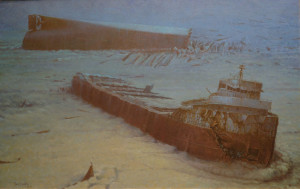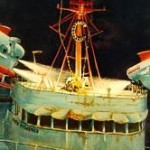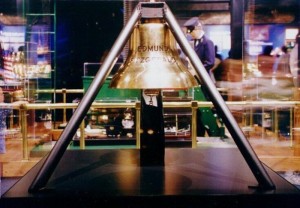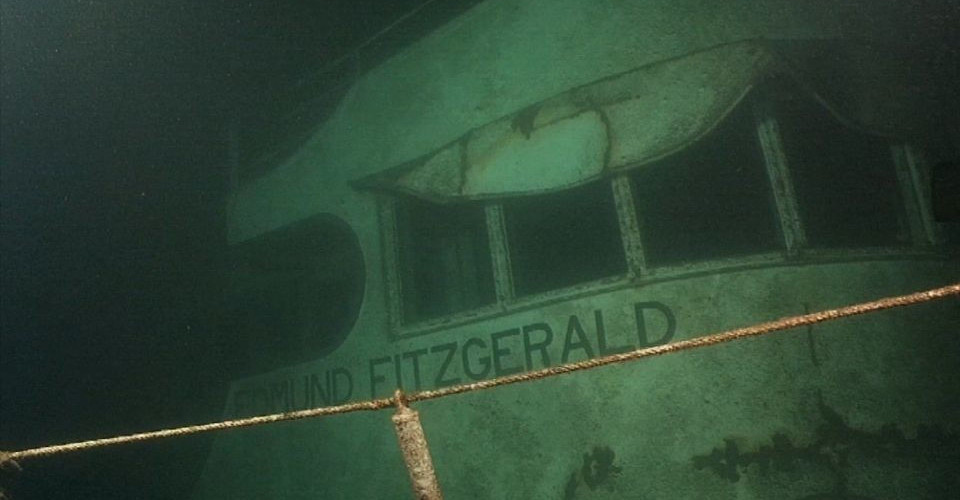Tragedy on Lake Superior: The Wreck of The Edmund Fitzgerald
- Zach Jenkins
- Nov 12, 2020
- 3 min read
"Does any one know where the love of God goes
When the waves turn the minutes to hours?
The searchers all say they'd have made Whitefish Bay
If they'd put fifteen more miles behind her
They might have split up or they might have capsized
They may have broke deep and took water
And all that remains is the faces and the names
Of the wives and the sons and the daughters"
Those are lyrics from the song "The Wreck of the Edmund Fitzgerald" by Gordon Lightfoot. The whole song is great but haunting. On November 10, 1975 a shipping boat named SS Edmund Fitzgerald sank in a storm on Lake Superior. 29 men went down with the ship that night. The Fitzgerald was christened on June 8th, 1958. The ship was designed specifically to carry iron ore (taconite pellets) from mines near Duluth, WI back to Detroit and Toledo. Overall, the ship was 730 long, 75 wide and 39 high. At the time, it was the largest iron ore carrier on the Great Lakes when it entered service. "As the big freighters go, it was bigger than most with a crew and good captain well seasoned".
The Fitzgerald left Superior, WI at 2:15 pm on November 9th. She was captained by a 44 year maritime veteran Ernest M. McSorley. As the ship was en route, McSorley met another vessel named The Arthur Anderson. The two ships decided to travel together and went north of the common shipping lanes trying to evade a storm that was brewing on the lake. "The lake it is said never gives up her dead when the skies of November turn gloomy".
In the late afternoon of November 10th, the storm began to intensify. The Fitzgerald was being battered by the waves. They were already losing ship parts and taking on water. By 3:50, McSorley and the Fitzgerald had lost all radar systems and were depending on the Anderson for navigational assistance. Not only was McSorley without his radar, but the vital lighthouse at Whitefish Point was found to be out of service during the most crucial of times, with 29 lives in the balance. "The captain wired in he had water comin' in and the good ship and crew was in peril"
At 7:10, Capt. McSorley sent his last radio message. When asked how they were doing, the captain simply stated "We are holding our own". Almost immediately after that message, the Anderson lost sight of the Fitzgerald in a blinding snow storm. It was like the mighty ore carrier simply vanished from the lake, like some sort of ghostly pirate ship slipping into the mists. The Anderson reached out to ships in the area for assistance and finally the Coast Guard was called in. But by 9:25 pm on November 10th, the Edmund Fitzgerald was declared missing. "And later that night when his lights went outta sight came the wreck of the Edmund Fitzgerald".
It took until May of 1976, but the true resting place of the Edmund Fitzgerald was confirmed on the floor of Lake Superior. The timeline of the tragedy is well documented, as most maritime voyages are. What's missing is the personal account of the men on the SS Edmund Fitzgerald. We'll never know what they felt during their ordeal. I'd imagine those men, in the bottom of their hearts, knew their doom was approaching. In the vastness of the Great Lakes, help is far away. They probably trusted in their captain until the bitter end. "In the maritime sailors' cathedral the church bell chimed 'til it rang twenty-nine times for each man on the Edmund Fitzgerald"
They were so close to making it home safe. The calmer waters of Whitefish Bay were only 17 miles away. Did the captains decision to go north of the usual shipping lane play any factors? How critical was the ships age and lack of maritime developments like water tight seals? There is an extensive report that details what all the probably causes were that led to the sinking. It's all speculation but the common thought is the severity of the storm caused the boat to take on water and begin it's initial list. Then, a main bulk hatch that wasn't watertight burst open and spelled the end for the Edmund Fitzgerald. "When suppertime came, the old cook came on deck sayin' "Fellas, it's too rough to feed ya"
At seven PM, a main hatchway caved in, he said "Fellas, it's been good to know ya".
For more information on the wreck of the Edmund Fitzgerald (and other maritime history) you can visit a number sites:














Comments